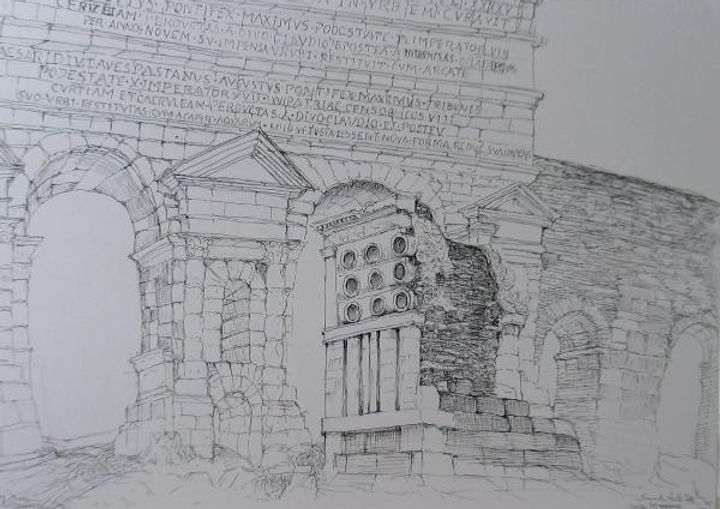José F. Grave de Peralta

Black and White/ inks
My work in black and white includes pencil, charcoal, and pen and ink. Although for some artists and art lovers, non-color artworks are not as powerful or pleasant as color images, for me the black and white sketch or rendering often explains deeper structural components of a subject or transmits deeper ideas about a figure or scenery. The connection of these two dimensions with moral questions and heroism and virtue since Antiquity is present in the design of temples and shrines to the deities and to the conviction that such a discourse of forces in a statue or structure, when visible, would make the inhabitants of a city more virtuous as well. The following black and white images display wide varieties of themes and subjects that I have drawn or watercolored in greytones or black and white during many years, usually with the heroic or devotional element present in my hand as I drew.
*******
Below, according to certain architectural guides to Rome, this gateway to eastern Rome -- Porta Maggiore -- received its name from the fact that one of its thoroughfares leads directly to Santa Maria Maggiore, one of the great Seven Churches of the city.
The charming Baker's Monument to Eurisace, a very wealthy freed slave who lived
around 30 B.C. and made a prosperous living from this trade, My pen&ink homage to this site Porta Maggiore and its connection not only to the Baker's Tomb but to
several of Rome's aqueducts -- Aqua Claudia and Aqua Anio Novus -- which both"piggy-back" on each other to ride their waters into Rome at that point!
"piggy-back" on each other to ride their waters into Rome at that point!

Porta Maggiore and Monument to the Baker Eurisace
pen & ink
9 1/2" x 13 "
2011

Porta Furba~~~~ruins of Aqua Claudia
pen & ink
9 1/2" x 13 "
2011

Ponte Rotto -- Roma
pen & ink
9 1/2" x 13 "
2011

Porta Furba~~~~ruins of Aqua Claudia
pen & ink
9 1/2" x 13 "
2011

Hercules and the Nemean Lion
in-situ pencil drawing from a Christian tomb in the Basilica of Santa Maria Sopra Minerva
5 " x 13 "
2013
Neptune Mosaic fragment
in-situ watercolor study from Baths of Caracalla/ROME
8" x 13 "
2011

Neptune Mosaic fragment
in-situ watercolor study from Baths of Caracalla/ ROME
8" x 13 "
2011

Grottesques
in-situ pen & ink study from
Villa D'Este/TIVOLI
9 1/2" x 13 "
2011

Funeral of a hero
in-situ pencil study from Etruscan funerary urn in bronze, Temple of Fortuna (Pallestrina)
9 1/2" x 13 "
2014

Apollo slays the seven children of Niobe
in-situ pencil study from "graphite" fresco on exterior wall of Renaissance palazzo in Rome
9 1/2" x 13 "
2012

ACTEON transformed into a Stag
in-situ pencil drawing from fountain in
Reggio di Caserta (Naples)
9 1/2" x 13 "
2014


Vase with Bacchic Dancers from Villa Borghese
after engraving by Giovanni Battista PIRANESI
pen & ink 12" x 10"
2016

Detail from Vase of Sacrifice of Iphigenia
after engraving by Giovanni Battista PIRANESI
pen & ink 12" x 8"
2016

Etruscan Capitol
after engraving by Giovanni Battista PIRANESI
pen & ink 8" x 5"
2016
Funerary Urn with Bacchic Dancers
after engraving by Giovanni Battista PIRANESI
pen & ink 10" x 12"
2016


Candelabro
after fresco by RAPHAEL
pen & ink 4" x 12"
2016
Because, as stated above, for me the black and white sketch or rendering often explains deeper structural components of a subject or transmits deeper ideas about a figure or scenery, I often turn to printed reproductions of (fresco) paintings or engravings by Raphael and PIRANESI in order to enjoy the challenge of drawing these FORMS in the old-fashioned nib pen&ink medium, with ink well and all! In most of these I use little or no preliminary PENCIL guidelines, so these drawing exercises are a test of my concentration, the eye-hand coordination, and the "freehand" or so-called raised-hand way of drawing which used to be taught in the better architecture curriculum.


Various studies of Greek vases
from Museum of Villa Giulia / ROME
pencil 14" x 17""
2017